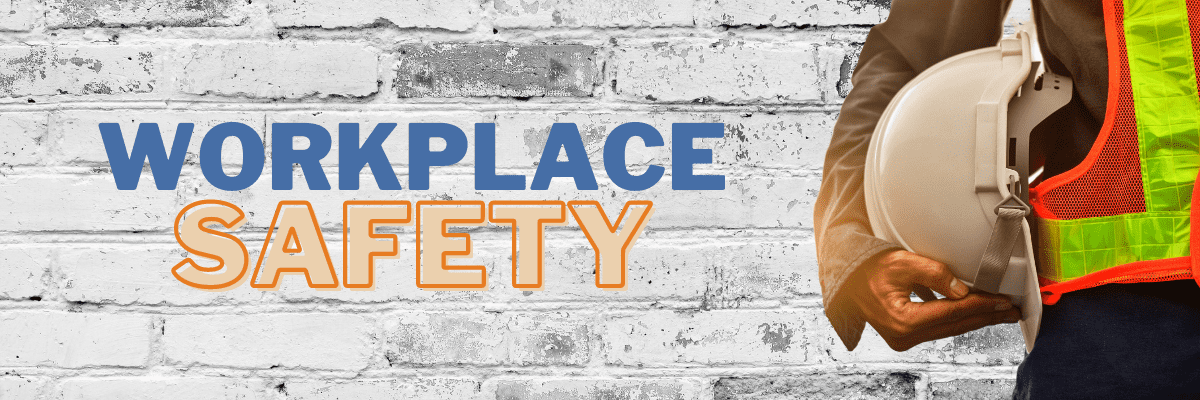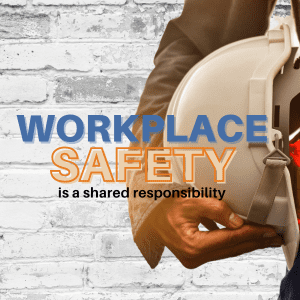Workplace Safety is a Shared Responsibility
 A safe and secure workplace not only protects you from harm but also promotes productivity, job satisfaction, and overall success. As we continue to navigate the ever-changing landscape of work, it is crucial that we all reaffirm our commitment to workplace safety.
A safe and secure workplace not only protects you from harm but also promotes productivity, job satisfaction, and overall success. As we continue to navigate the ever-changing landscape of work, it is crucial that we all reaffirm our commitment to workplace safety.
Adhere to all Safety Guidelines:
Familiarize yourself with the safety protocols and guidelines established by your organization. These guidelines exist to protect you and your colleagues. Make sure you understand them thoroughly and follow them diligently. If you have any questions or concerns, don’t hesitate to reach out to your supervisor or the designated safety officer.
Maintain a Clean and Organized Workspace:
A clutter-free and well-organized workspace not only enhances productivity but also reduces the risk of accidents and injuries. Keep your work area clean, properly store equipment, and promptly report any hazards or potential risks to the appropriate authorities.
Report Incidents and Near-Misses:
Reporting incidents and near-misses is crucial for identifying potential hazards and implementing preventative measures. If you witness an accident, unsafe condition, or near-miss, report it to your supervisor or the designated reporting channels immediately. Your timely reporting can prevent future incidents and ensure the safety of everyone in the workplace.
Utilize Personal Protective Equipment (PPE):
Depending on the nature of your work, you may be required to wear personal protective equipment (PPE) such as safety helmets, goggles, gloves, or masks. It is essential to wear and maintain your PPE properly to safeguard yourself and others. Regularly inspect your equipment, replace damaged items, and store them in designated areas when not in use.
Stay Informed About Safe Work Practices:
Stay up-to-date with the latest safety practices and procedures by attending all safety training sessions that are offered to you. Take advantage of those opportunities to enhance your understanding of safety protocols and share your knowledge with colleagues.











 No matter how cliche it may sound, you never do get a second chance to make a first impression. What you wear to an interview tells the person you are speaking with a lot about you. It demonstrates your decision making, and it helps them see how you will fit in amongst the rest of their team. The hiring manager knows that during an interview you are presenting your best version of yourself – so while there is some understanding for small faux pas, there are some generally accepted style expectations.
No matter how cliche it may sound, you never do get a second chance to make a first impression. What you wear to an interview tells the person you are speaking with a lot about you. It demonstrates your decision making, and it helps them see how you will fit in amongst the rest of their team. The hiring manager knows that during an interview you are presenting your best version of yourself – so while there is some understanding for small faux pas, there are some generally accepted style expectations.














 Ask Manpower:
Ask Manpower:






 There is much to be learned at any job you hold in your life. Skills that can be incredibly useful in a number of future professions. Whether working in retail, hospitality, food service, or in a call center – when you are serving customers, you are learning skills that are highly desired by any company.
There is much to be learned at any job you hold in your life. Skills that can be incredibly useful in a number of future professions. Whether working in retail, hospitality, food service, or in a call center – when you are serving customers, you are learning skills that are highly desired by any company.

 While most people primarily view work as an income generator, have you considered the overall health benefits that the act of working brings to your life? So much of who we are and how we spend our time is wrapped into our profession that it stands to reason that it has an impact on overall well-being.
While most people primarily view work as an income generator, have you considered the overall health benefits that the act of working brings to your life? So much of who we are and how we spend our time is wrapped into our profession that it stands to reason that it has an impact on overall well-being.